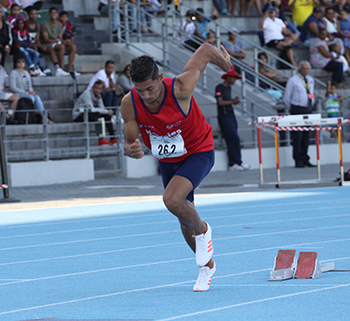
Wayde van Niekerk is in great form leading up to the
World Championships in London in August.
Photo: Khothatso Mokone
Usain Bolt believes Wayde van Niekerk could well be his successor. Bolt, who has won eight Olympic and 11 world gold medals in his career, doesn’t doubt that the Kovsie athlete could take over the reins as an athletic superstar.
This after Van Niekerk broke another world record by Michael Johnson – 30.85 seconds in the 300 m which Johnson set in Pretoria in 2000 – at the IAAF Golden Spike meeting in Ostrava, Czech Republic, on 28 June 2017. He took the honours in the 300 m in a time of 30.81 seconds. In 2016, Van Niekerk also improved on Johnson’s 400 m world record (43.18 s) with a time of 43.03 s at the Rio Olympics.
Unique honour over four distances
Because the 300 m event is not run very often, the record will be regarded as the world’s best by the IAAF. According to the IAAF, the 24-year-old Van Niekerk is now also the first man to run a sub-10 for the 100 m, sub-20 for 200 m, sub-31 for 300 m, and sub-44 for 400 m.
The legendary Bolt, who is in his final season, admitted that Van Niekerk could take over from him. “I think he really wants to be a sprinter, because he's set a personal best in the 100 m this year,” he said to AFP.
“He's shown that he's ready for the challenge. He's really down to earth, he's really humble, he's a great person. He listens and wants to be good, and if he continues like this he'll take over track and field."
Great run prior to Czech Republic
The 300 m world record follows after Van Niekerk also ran a personal best time of 9.94 in the 100 m in Velenje, Slovenia, on 20 June 2017. The 400 m world record-holder also became the South African record-holder in the 200 m again when ran a 19.84 in the 200 m at the Racers Grand Prix in Kingston, Jamaica, on 11 June 2017.